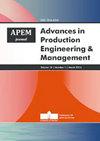Interactive impacts of overconfidence and fairness concern on supply chain performance
IF 2.8
3区 工程技术
Q2 ENGINEERING, MANUFACTURING
引用次数: 4
Abstract
For exploring the interactive impacts of overconfidence and fairness concern on optimal decisions of manufacturer and retailer, we establish Stackelberg models with these two behavioural preferences in a two‐echelon supply chain, wherein retailer has two behavioural preferences. The optimal equilibrium results are compared in different scenarios, namely the retailer with no be‐ havioural preference, with single‐behavioural preference and with the two behavioural preferences. Although previous literatures have proven that overconfidence or fairness concern has a negative influence on retailer, we find that the retailer always benefits from these two behavioural preferences, whether it is retail price, sales effort or utility. This is because when the over‐ confident degree is within a reasonable range, overconfidence and fairness concern have a positive influence on retailer's decision‐making, and when the overconfident degree is high, the fairness concern preference can suppress the adverse effects caused by overconfidence. Compared with the preference of fairness concern, the overconfident preference plays a leading role in supply chain performance, which mainly manifests in retailer’s decisions, utility and manufacturer profit. Moreover, the wholesale price and profit of the rational manufacturer may become worsen due to the fairness concern of retailer. © 2020 CPE, University of Maribor. All rights reserved.过度自信与公平关注对供应链绩效的交互影响
为了探讨过度自信和公平关注对制造商和零售商最优决策的交互影响,我们在两级供应链中建立了包含这两种行为偏好的Stackelberg模型,其中零售商有两种行为偏好。最优均衡结果在不同的情况下进行了比较,即零售商没有行为偏好,有单一行为偏好和有两种行为偏好。虽然之前的文献已经证明过度自信或公平关注对零售商有负面影响,但我们发现无论是零售价格、销售努力还是效用,零售商总是从这两种行为偏好中受益。这是因为当过度自信程度在合理范围内时,过度自信和公平关注对零售商的决策有正向影响,而当过度自信程度较高时,公平关注偏好可以抑制过度自信带来的不利影响。与关注公平的偏好相比,过度自信的偏好对供应链绩效起主导作用,主要表现在零售商决策、效用和制造商利润三个方面。此外,由于零售商的公平考虑,理性制造商的批发价格和利润可能会恶化。©2020 CPE,马里博尔大学。版权所有。
本文章由计算机程序翻译,如有差异,请以英文原文为准。
求助全文
约1分钟内获得全文
求助全文
来源期刊

Advances in Production Engineering & Management
ENGINEERING, MANUFACTURINGMATERIALS SCIENC-MATERIALS SCIENCE, MULTIDISCIPLINARY
CiteScore
5.90
自引率
22.20%
发文量
19
期刊介绍:
Advances in Production Engineering & Management (APEM journal) is an interdisciplinary international academic journal published quarterly. The main goal of the APEM journal is to present original, high quality, theoretical and application-oriented research developments in all areas of production engineering and production management to a broad audience of academics and practitioners. In order to bridge the gap between theory and practice, applications based on advanced theory and case studies are particularly welcome. For theoretical papers, their originality and research contributions are the main factors in the evaluation process. General approaches, formalisms, algorithms or techniques should be illustrated with significant applications that demonstrate their applicability to real-world problems. Please note the APEM journal is not intended especially for studying problems in the finance, economics, business, and bank sectors even though the methodology in the paper is quality/project management oriented. Therefore, the papers should include a substantial level of engineering issues in the field of manufacturing engineering.
 求助内容:
求助内容: 应助结果提醒方式:
应助结果提醒方式:


